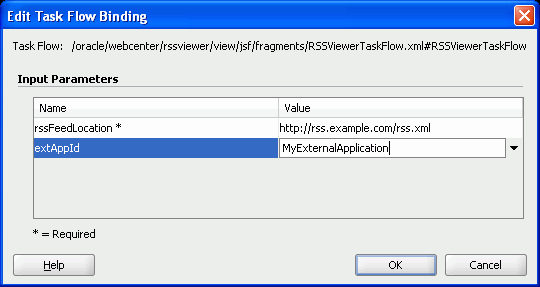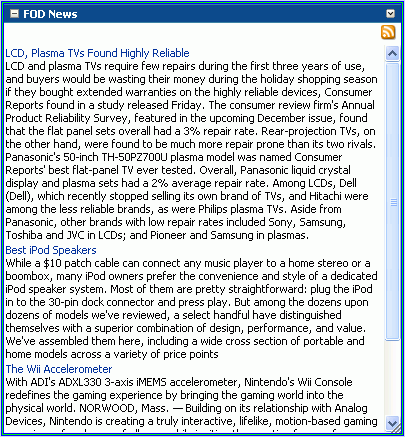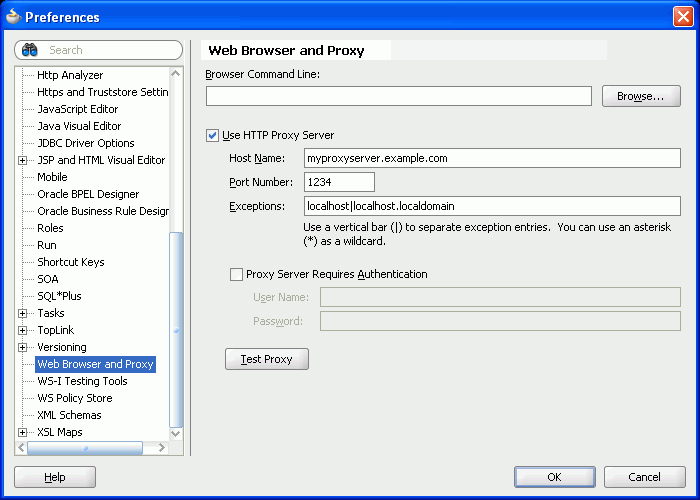15 Integrating the RSS Service
The RSS service enables your application users to add and view RSS 2.0 formatted feeds within your application. This chapter describes how to integrate the RSS service into a custom WebCenter application at design time.
This chapter includes the following sections:
For more information about managing and including RSS feeds, see:
-
"Managing the RSS Service" in the Oracle Fusion Middleware Administrator's Guide for Oracle WebCenter
-
"Working with the RSS Service" in the Oracle Fusion Middleware User's Guide for Oracle WebCenter
15.1 Introduction to the RSS Service
Really Simple Syndication (RSS) provides a means of accessing the content of many different web sites from a single location—a news reader. Oracle WebCenter includes the RSS service that enables you to view news feeds from different web sites from within your WebCenter applications.
This section provides an overview of the features and requirements of the RSS service. It contains the following subsections:
15.1.1 Understanding the RSS Service
To integrate the RSS service into your custom WebCenter application, you add the RSS Viewer task flow and specify the URL for the required RSS feed, as shown in Figure 15-1. Your application users can then view the RSS feed at runtime.
The RSS service also enables you to display news feeds from external sources on your application pages. For accessing secure application content, the RSS Viewer task flow supports integration with external applications to provide credential mapping services to authenticate with a remote feed. For information about using external applications, see Section 37.2, "Working with External Applications."
Figure 15-1 RSS Details Specified at Design Time

Description of "Figure 15-1 RSS Details Specified at Design Time"
15.1.2 Requirements for the RSS Service
The RSS service does not require any back-end server. You do not need to set up a connection to use this service. However, you can set up a proxy for the RSS service, if required.
15.1.3 What Happens at Runtime
At runtime, RSS news feeds are displayed from the RSS feed location specified at design time. Users can click the RSS icon on the top-right corner of the application page to open the URL specified as the RSS feed location.
Any user who has permissions to modify the application page can change the URL of the RSS feed.
For information about the RSS service at runtime, see the "Working with the RSS Service" chapter in the Oracle Fusion Middleware User's Guide for Oracle WebCenter.
Note:
You can see the RSS service in action in the sample application Fusion Order Demo for WebCenter, as described in Chapter 2, "Introduction to the WebCenter Sample Application."15.2 Basic Configuration for the RSS Service
This section describes how to set up the proxy server for the RSS service and add the RSS Viewer task flow to your custom WebCenter application.
This section contains the following subsections:
-
Section 15.2.1, "Setting Up a Proxy Server for the RSS Service"
-
Section 15.2.3, "Setting Security for the RSS Viewer Service"
15.2.1 Setting Up a Proxy Server for the RSS Service
The RSS service does not require any connections. You can simply point to the URL of the RSS feed. However, if you want to point to an RSS feed that is external to your intranet and application, you may need to set up a proxy server for your application.
To set up a proxy server for the RSS service:
-
In Oracle JDeveloper, while your application is open and selected in the Application Navigator, choose the Tools menu option, then select Preferences.
-
In the Preferences dialog, scroll down the list on the left side and select Web Browser and Proxy.
-
In the right pane, under Web Browser and Proxy, select Use HTTP Proxy Server and enter the host name and port number of your proxy server, and note any exceptions (Figure 15-3).
-
Click OK.
15.2.2 Adding the RSS Service at Design Time
This section describes the RSS Viewer task flow and how to add it to your application.
This section contains the following subsections:
15.2.2.1 About RSS Viewer Task Flow
The RSS service has a single task flow called RSS Viewer, which you can add to your application to enable your users to access an RSS feed. You can add multiple instances of the task flow to your application and use the Edit Task Flow Binding dialog to point to multiple RSS feed locations.
15.2.2.2 How to Add the RSS Viewer Task Flow to Your Application
To add the RSS Viewer task flow to your application:
-
Follow the steps in Section 4.1.1, "How to Prepare Your Application to Consume Services" to implement security, if necessary, and create a customizable page in your application.
-
Open the customizable page.
-
If the RSS feed you want to use requires authentication, create an external application. If it does not require authentication, proceed to Step 4.
Note:
For more information about external applications, refer to Section 37.2, "Working with External Applications." -
In the Resource Palette, open the WebCenter Services Catalog, then expand the Task Flows folder.
-
Click RSS Viewer, drag it to your page in the Design view, and choose Region.
-
In the Edit Task Flow Binding dialog, you can set the location of the RSS feed and enter the name (the application name, not the application display name) of the external application that the custom WebCenter application can use to authenticate RSS feed.
Figure 15-4 Example of the Edit Task Flow Binding Dialog for the RSS Service

Description of "Figure 15-4 Example of the Edit Task Flow Binding Dialog for the RSS Service"
Table 15-1 describes the possible values for the RSS Viewer task flow binding parameters.
Table 15-1 RSS Viewer Task Flow Binding Parameters
Parameter Value rssFeedLocationEnter the location of the RSS feed. For example, to use the Oracle Press Releases RSS feed, enter:
${'http://www.oracle.com/rss/rss_ocom_pr.xml'}extAppIdEnter the name of the external application you want to use to authenticate the custom WebCenter application with the RSS feed. If the RSS feed does not require authentication, you do not need to set up and identify an external application for this service.
-
Click OK and save your page. The binding displays on your page.
If you look at the Source tab of your page, you can see the RSS Viewer task flow in the page source (Figure 15-5).
Figure 15-5 RSS Viewer Task Flow in the Page Source

Description of "Figure 15-5 RSS Viewer Task Flow in the Page Source"
15.2.3 Setting Security for the RSS Viewer Service
To use the RSS service with a public RSS feed, you do not need to set security. To use the RSS service with an RSS feed that requires authentication, you can set up an external application for your custom WebCenter application that sets up either user credentials or public credentials for accessing the RSS feed.
Note:
For secure application content, your news reader must support BASIC authentication.For more information on using external applications, see Section 37.2, "Working with External Applications."
Only authenticated users can view secure RSS feeds. If a user is not authenticated and the RSS feed is secured, the user will not see any content in the RSS Viewer unless the external application specifies PUBLIC credentials.
Note:
When you add the RSS Viewer task flow to your application, the View grant is automatically added to theauthenticated-role.
